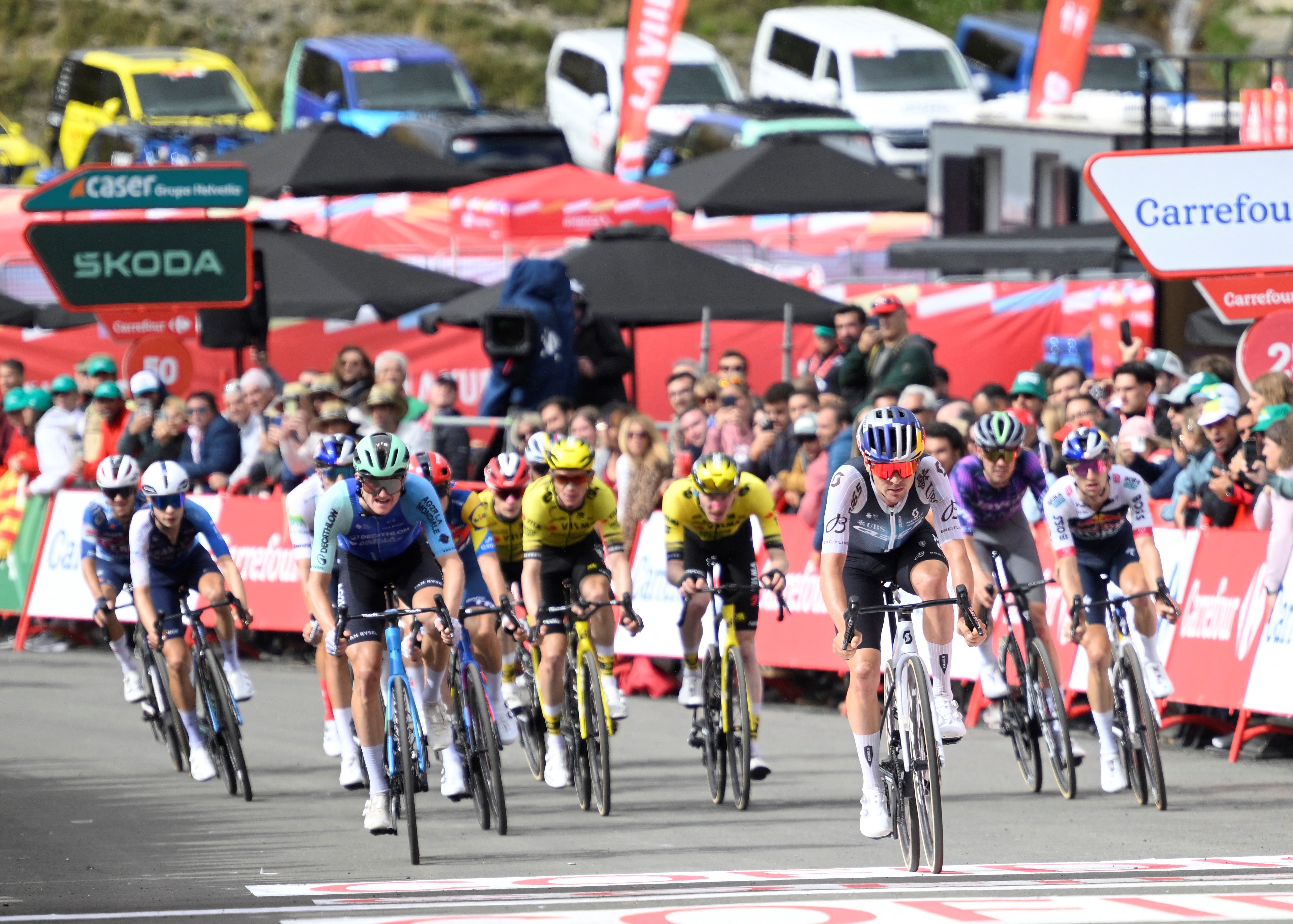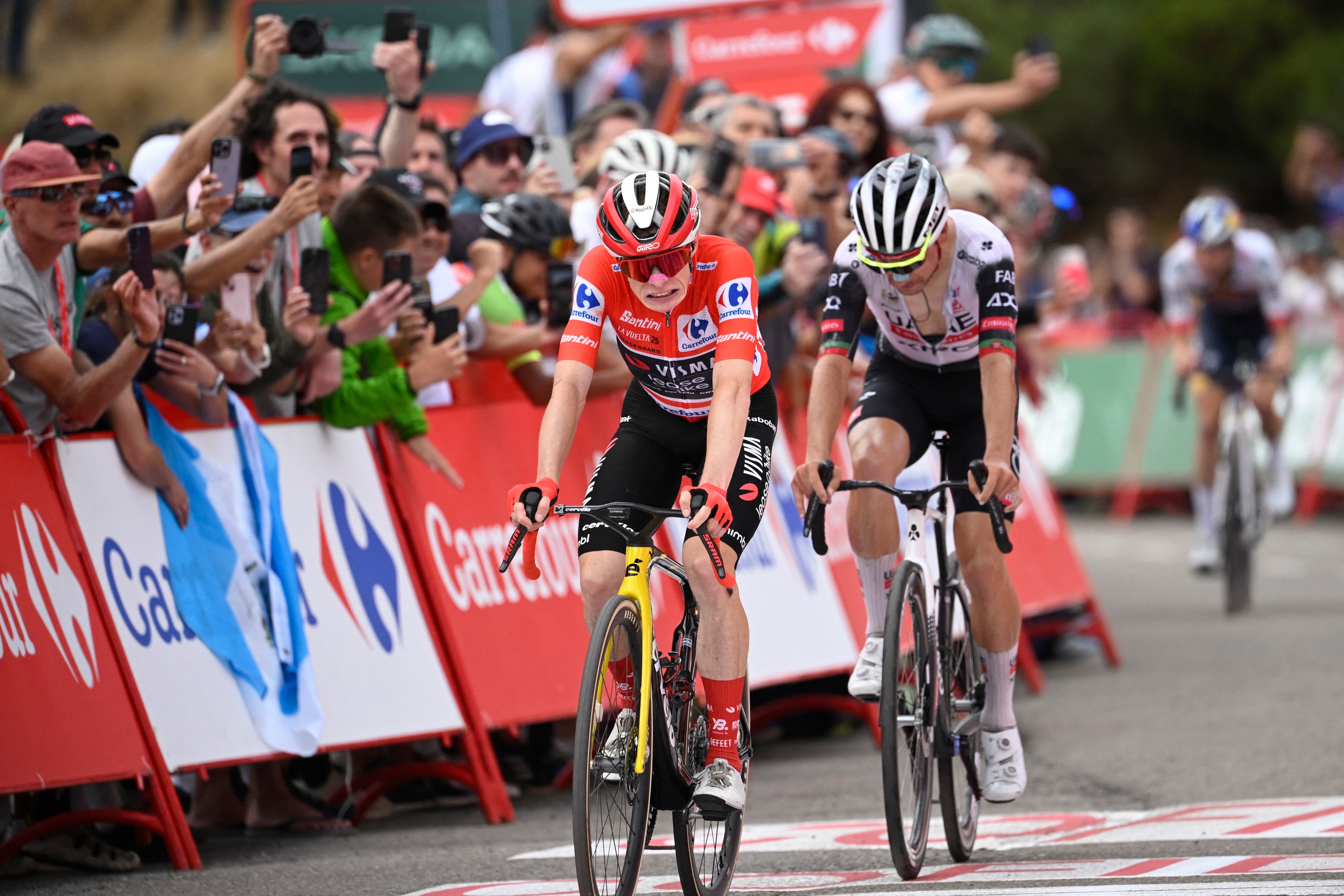At the end of this year’s Giro d’Italia Tom Pidcock was frustrated. The experience of his fifth grand tour wasn’t terrible: he finished 16th overall, with a collection of top-ten finishes on stages. But when he spoke to The Independent in Rome, every positive sentence discussing his race felt like it came with an unspoken “but…”. The race was a missed opportunity, and Pidcock felt it keenly.
Things feel very different now. With three stages remaining at the Vuelta a Espana, Pidcock is poised for the best result at a grand tour in his entire career. Third going into the final weekend behind two-time Tour de France champion Jonas Vingegaard and his rival Joao Almeida, Pidcock has well and truly arrived as a grand tour racer.
He has yet to win a stage (pro-Palestine protests forced the cancellation of stage 11 and deprived him of a likely win then) but has been second twice, both on difficult summit finishes, and in the top 10 another four times so far. He sits 2’39” down on race leader Vingegaard, who he briefly distanced with a stunning acceleration on stage 11, and 39 seconds clear of his closest challenger for the podium, Jai Hindley.
His form is clearly superb, but grand tour racing is about more than just form. Significantly, the 26-year-old has cut a more relaxed figure, too, aside from his evident frustration at being denied a stage win in Bilbao. He has been reluctant to speak bullishly about his chances, opting for the standard athlete-ese of taking each day as it comes.
But that philosophy has stood him in good stead. He has largely kept pace with his biggest rivals on GC, and ridden intelligently on the most brutal mountain stages to limit his losses. Not only has this been his best performance form-wise over three weeks, it has also been his most mature. It’s a telling sign that he has both the attitude and ability to compete at the highest levels at a grand tour – something that wasn’t always the case.
The toughest challenge is still to come, with Saturday’s penultimate stage featuring five mountains including a hors-categorie summit finish on the Bola del Mundo. Pidcock lost 1’32” to Vingegaard on the only stage to rival 20 for difficulty, stage 13’s 202km run to the summit of the infamous Angliru.

The in-form Hindley moved up four places in the overall standings then and has been building in strength throughout this race. A former Giro d’Italia champion, he is the biggest threat to Pidcock’s maiden grand tour podium. But Pidcock overcame one stern test from him in stage 18’s time trial, adding to his lead by another three seconds, having been expected to lose some time to the Australian.
“After Bilbao, the stage took a lot out of me mentally to deal with it, and I think I suffered in the last part of the second week. But this week I feel again like I did in the first part of the race, I feel super good,” Pidcock said after the ITT. “Definitely confident but not getting complacent. For me, finishing on the podium is bigger than a stage win, much as I’d like to win.”
Regardless of what happens on the Bola del Mundo, and whether he picks up a stage win or not, this Vuelta has been an enormous success for Pidcock. After an assortment of top-20 finishes on GC at the Giro and Tour de France, he will leave Madrid with at least a top five, and confidence that he can build on that in the future.
There has been an element of trial and error to his first full year with Q36.5. Pidcock admitted that his build-up to the Giro was less than ideal, having raced a full-on calendar from the UAE Tour in January all the way through the spring, leaving him with little in the tank in Italy. The second-tier team’s preparation was further hampered by only receiving news of their wildcard to the Giro a shade over five weeks before the start.

The Vuelta was different; Q36.5 had it on the agenda months in advance, and Pidcock returned refreshed and rejuvenated for the second half of the season, having learned his lesson. It’s paid off.
What makes this achievement all the more impressive is that Pidcock has not been able to call on the might of the super-teams supporting Vingegaard, Almeida, and even Hindley. Those around him on GC have the world’s best domestiques at their disposal, and all the infrastructure and machinery of the peloton’s biggest-budget teams. Q36.5 cannot claim either of those but have punched well above their weight throughout this race – and have demonstrated a commitment to their team leader that Almeida, even with his squad of superstars, would no doubt envy.
Perhaps the most exciting element of Pidcock’s arrival as a grand tour rider is that this feels like only the start. Eddie Dunbar – a double Vuelta stage winner – and Chris Harper, a Giro stage winner earlier this year, are set to join the team in 2026, and will be invaluable support to Pidcock in the high mountains of a grand tour. Further arrivals in Fred Wright and the Alpecin-Deceuninck pair of Quinten Hermans and Xandro Meurisse will add firepower on more rolling terrain. Pidcock’s squad of overachievers this year may be a serious force to watch next season.
A month on from compatriot Oscar Onley’s coming of age at the Tour de France, Pidcock – a rider who has achieved an enormous amount in what is still a young career – has achieved the same in his second act. He was already a fine one-day racer and Classics specialist, to go with his prowess in cyclo-cross and on the mountain bike. Now he has proved he belongs among the grand tour contenders. The next step is to see just how far he can go.
Riders threaten to quit Vuelta a Espana if pro-Palestine protests disrupt race again
‘We love you G’: How Cardiff delivered Geraint Thomas the ultimate farewell
The fatal flaw that could spell the end for Tadej Pogacar’s team
Tom Pidcock cements grip on Vuelta podium position as Filippo Ganna wins stage 18
Riders threaten to quit Vuelta a Espana if pro-Palestine protests disrupt race again
Kylian Mbappe makes candid admission on mental health among elite athletes







